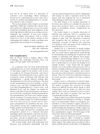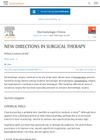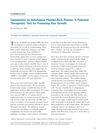 11 citations,
May 1976 in “Archives of Dermatology”
11 citations,
May 1976 in “Archives of Dermatology” Starving yourself can cause hair loss, but stopping the diet can improve it.
[object Object]  December 2011 in “Journal of The American Academy of Dermatology”
December 2011 in “Journal of The American Academy of Dermatology” The book is a detailed and useful guide for doctors learning about hair transplantation.
 16 citations,
January 2007 in “Journal of Obstetrics and Gynaecology”
16 citations,
January 2007 in “Journal of Obstetrics and Gynaecology” The document suggests various treatments for PCOS, including medication for menstrual issues, insulin resistance, and excess hair, as well as fertility treatments, while highlighting the need for personalized care and lifestyle changes.
 May 2024 in “Archives of dermatological research”
May 2024 in “Archives of dermatological research” LGFs slightly improve hair transplant results more than PRP.
Adalimumab significantly improved Hidradenitis Suppurativa and quality of life in two patients.

The document is a detailed guide on skin conditions and treatments for dermatologists.
 10 citations,
June 2010 in “Fertility and Sterility”
10 citations,
June 2010 in “Fertility and Sterility” Patients with PCOS tend to score their hirsutism higher than clinicians, making self-scoring less useful for diagnosis.
 97 citations,
March 2009 in “Dermato-endocrinology”
97 citations,
March 2009 in “Dermato-endocrinology” Hormones significantly affect hair and oil gland function in the skin, and more research is needed on skin-related hormone disorders.
[object Object] 
The case showed the need for quick investigation of virilization in women and how emotional health is linked to physical health.
 45 citations,
February 2005 in “Steroids”
45 citations,
February 2005 in “Steroids” Four new compounds were more effective than finasteride in treating prostate issues and hair loss, with one being 100 times more active and safe for use.
 January 2012 in “Yearbook of Dermatology and Dermatologic Surgery”
January 2012 in “Yearbook of Dermatology and Dermatologic Surgery” Some African American women experience central scalp hair loss, often linked to a history of fungal scalp infection.
 1 citations,
April 1998 in “Dermatologic Clinics”
1 citations,
April 1998 in “Dermatologic Clinics” Surgical skin treatments improved with new methods like laser resurfacing, combined techniques, and better hair and fat removal options.
 February 2021 in “Austin journal of nutrition & metabolism”
February 2021 in “Austin journal of nutrition & metabolism” Appropriate zinc levels may help prevent hair loss in university students.
 13 citations,
July 2012 in “Dermatologic Surgery”
13 citations,
July 2012 in “Dermatologic Surgery” Platelet-rich plasma (PRP) may help promote hair growth and improve graft survival after hair transplantation, but more research is needed to confirm its effectiveness and determine the best dosage.
 4 citations,
February 2011 in “Dermatology reports”
4 citations,
February 2011 in “Dermatology reports” Acitretin can cause excess tissue growth and hair loss.
January 2021 in “International Research Journal of Ayurveda & Yoga” PCOS can be treated with Ayurvedic therapies that balance doshas and improve digestion.
 64 citations,
March 2006 in “Food Chemistry”
64 citations,
March 2006 in “Food Chemistry” The triterpenoids from Ganoderma lucidum can block testosterone effects and may help treat enlarged prostate.
 137 citations,
June 2005 in “Climacteric”
137 citations,
June 2005 in “Climacteric” Estrogen loss during menopause worsens skin health, but hormone replacement therapy may improve it, though more research is needed.
 February 2009 in “Springer eBooks”
February 2009 in “Springer eBooks” Pregnancy can cause more body and scalp hair growth and make nails brittle, but these changes often revert after giving birth.
 30 citations,
October 2002 in “Journal of The American Academy of Dermatology”
30 citations,
October 2002 in “Journal of The American Academy of Dermatology” Use "female pattern hair loss" term, finasteride may help, more research needed.
 1 citations,
May 2009 in “Wiley-Blackwell eBooks”
1 citations,
May 2009 in “Wiley-Blackwell eBooks” Early treatment of PCOS in teens is crucial to prevent long-term health issues like diabetes and heart disease.
 4 citations,
December 1997 in “Clinical Endocrinology”
4 citations,
December 1997 in “Clinical Endocrinology” Spironolactone may help reduce hair loss in androgenic alopecia.
 8 citations,
May 1996 in “Endocrinology”
8 citations,
May 1996 in “Endocrinology” Certain adrenal hormones can strongly stimulate oil gland growth in hamster skin, similar to male hormones.
November 2020 in “Case reports in endocrinology” Removing one ovary helped treat a woman's severe PCOS symptoms when medicine didn't work.
 4 citations,
July 2019 in “Children (Basel)”
4 citations,
July 2019 in “Children (Basel)” The review concludes that more research is needed to better improve the health outcomes for people with Polycystic Ovarian Syndrome.
 36 citations,
September 1999 in “Toxicologic pathology”
36 citations,
September 1999 in “Toxicologic pathology” Stronger corticosteroids cause more skin damage in hairless dogs, similar to effects in humans.
September 1976 in “PubMed” Hirsutism is excessive male-pattern hair growth mainly caused by ovarian hormones, and severe cases may require costly treatment with side effects.
 1 citations,
September 2023 in “JCEM case reports”
1 citations,
September 2023 in “JCEM case reports” GnRH analogues are effective for diagnosing and treating female androgen excess, offering a non-surgical option.
 July 2024 in “Gene & Protein in Disease”
July 2024 in “Gene & Protein in Disease” Exosome therapy shows promise for treating skin conditions and improving wound healing.
 1 citations,
April 2016 in “Journal of Investigative Dermatology”
1 citations,
April 2016 in “Journal of Investigative Dermatology” Prostaglandin D2 increases testosterone levels in skin cells through reactive oxygen species, not enzymes, which could lead to new hair loss treatments.


























